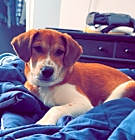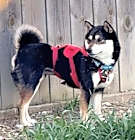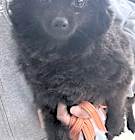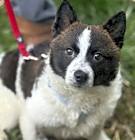Yes, Schipperkes shed, but they are considered moderate shedders. They have a double coat that tends to shed more heavily twice a year, typically in the spring and fall. Regular grooming can help minimize shedding and keep their coat in good condition.
Schipperke
Breed Type: Non-Sporting
Common nicknames: Spits, Spitzke, Little Black Fox
Coat: Double
Hypoallergenic: No, they will likely trigger allergies.
Temperament: Energetic, playful, loyal, gentle
Life expectancy: 12-15 years
Color & patterns: Black

With their distinctive black coats and fox-like faces, Schipperkes are truly captivating. Affectionately known as “Little Black Devils” due to their mischievous streak, Schipperkes are intelligent, agile, and full of personality. Standing at around 10 to 13 inches tall, they may be small in size, but they make up for it with their fearless and spirited nature. Whether mastering new tricks, participating in dog sports, or simply delighting you with their playful antics, the Schipperke’s independent and curious nature makes them a fascinating companion. Their alertness and natural curiosity also make them excellent watchdogs, and their devotion to their families is unmatched. Embrace the spunky charm of the Schipperke and welcome a playful, loyal companion who will brighten every moment of your life.
Schipperke characteristics
Learn about about Schipperke basics like their fur colors, shedding levels, how much grooming they need, and other Schipperke facts.
Average height
9-14 inches (22.9-35.6cm)
Average weight
9-19 pounds (4.1-8.6 kg)
Average lifespan
12-15 years
Exercise needs
Grooming needs
Full-grown size
Good with cats
Good with kids
Training Aptitude
How big do Schipperkes get?
Schipperkes will grow to be between 9 and 13 inches high and weigh between seven and 20 pounds. Males tend to be bigger than females.
Do Schipperkes have tails?
Yes, Schipperkes have tails. The natural tail of a Schipperke is typically carried high and may curve over the dog’s back. The medically unnecessary and outdated practice of tail docking, removing a portion of the tail for cosmetic purposes, has been historically associated with the breed, but it is not a natural trait and is widely discouraged by veterinarians and animal advocates.
How many types of Schipperke are there?
Apart from color variation, there is just one type of Schipperke.
How long do Schipperkes live?
Healthy Schipperkes will live to be between 12 and 16 years old. Lifespans can vary depending on a variety of factors, including genetics, diet, exercise, and overall care.
When do Schipperkes stop growing?
Schipperkes typically reach their full size when they are between 12 and 15 months old. Some dogs may continue to fill out until about 18 months old. After this time, dogs may still gain weight due to muscle development changes, but they won’t get much taller.
How do you pronounce Schipperke?
“Schipperke” is pronounced “SKIP-ur-kee,” with the emphasis on the first syllable. It’s a Dutch word, so the “sch” sound is similar to the English “sk” sound.
Schipperke history
Learn about where this Schipperke came from!
What were Schipperkes bred for?
Schipperkes can be traced back to Belgium in the 1600s, where they were bred down from the now-extinct sheepdog Leauvenaar. They were used as watchdogs, companions, ratters, and shepherds.
Where are Schipperkes from?
Schipperkes are from Belgium.
Schipperke temperament
Learn about about the Schipperke temperament and how well they fit into your lifestyle, home environment, and family.
Are Schipperkes good with kids?
Yes, Schipperkes are known to be incredibly gentle, affectionate, and kind with kids, and they have the boisterous energy to match those of active older kids. As with any breed, it is recommended that your child is always supervised when interacting with your Schipperke to keep both the child and dog safe. It’s important for pet parents to teach their dogs how to gently interact with children and for parents to teach kids how to gently interact with all dog breeds and recognize when they need space.
Are Schipperkes good family dogs?
Yes, Schipperkes make wonderful family dogs. They have a boisterous, good-natured energy, love to be included in family life, and are generally playful and loyal. They have a mischievous side, too, which is why they are sometimes referred to as the “Tasmanian Black Devil.”
Schipperkes are also generally great with kids, but, as with any breed, it is recommended that your child is always supervised when interacting with your dog to keep both the child and dog safe. Teaching children how to properly approach and handle dogs is crucial to ensure positive experiences for both the dog and the child, as is teaching dogs how to interact gently with children.
Do Schipperkes bark a lot?
Yes, Schipperkes are known for barking a lot, as they are alert and vocal dogs. Historically, they have been used as watchdogs aboard ships and herders of livestock. Schipperkes bark to alert, and they’re proud of themselves for doing so. As with any dog, they can be discouraged from barking as frequently with proper training and exercise.
Are Schipperkes good with cats?
No, Schipperkes are not always good with cats. They were used as ratters aboard ships and have a high prey drive, so they will likely give chase to your cat. Of course, each dog (and cat) has their own preferences and temperament, and you can feel fairly confident your Schipperke, if properly socialized to your cat and introduced at a young age, should get along with a cat just fine.
Are Schipperkes good with other dogs?
Schipperkes can be reserved or assertive toward other dogs, especially dogs of the same sex, and may show dominant behavior. Early introduction to another dog, especially if they are raised together, can help your Schipperke be more friendly with other dogs. Supervised interactions and training can also be helpful in teaching them appropriate behavior around other dogs.
Are Schipperkes smart?
Yes, Schipperkes are known for being smart. They are quick learners and are often described as clever and resourceful. They excel in obedience, agility, and rally, thanks to their eagerness to please. They are also known for their independent streak, which can sometimes translate into them finding creative solutions to problems. Schipperkes thrive on mental stimulation and enjoy activities and games that challenge their minds.
Are Schipperkes cuddly?
Schipperkes can be affectionate, but whether they are cuddly depends on the individual dog’s personality. Some are quite cuddly and enjoy snuggling up with their parents, while others may be more independent and prefer their space.
Are Schipperkes good for first-time pet parents?
Schipperkes can be a good choice for first-time dog parents, but they do require careful consideration and commitment due to their energetic nature and strong personalities. You should consider if you can provide daily walks, playtime, and activities to keep a Schipperke mentally and physically stimulated, provide them with adequate training, socialization and grooming. You may want to enlist the help of an experienced trainer if you are a first-time dog parent.
Are Schipperkes good guard dogs?
Yes, Schipperkes are naturally alert and possess strong watchdog instincts, making them good guard dogs. They are often wary of strangers and are quick to alert their parents to any perceived threats or changes in their environment. Despite being small, they have quite a vocal bark.
Are Schipperkes good therapy dogs?
No, while Schipperkes have many wonderful qualities, they are not typically recognized as good therapy dogs due to their high energy levels and independent natures. However, every dog is unique, and there may be some Schipperkes who excel in therapy work with the right training, socialization, and temperament.
Are Schipperkes good apartment dogs?
Schipperkes can adapt to apartment living, but they are better suited for homes with access to a fenced-in yard where they can run and play freely. Schipperkes are active dogs who require regular exercise and are known for their alertness and tendency to bark, which can be a concern in apartments.
Are Schipperkes easy to train?
No, Schipperkes are a willful and feisty breed and can be time-consuming to train. A patient trainer with a sense of humor and who uses lots of praise and positive reinforcement techniques is necessary to train this dog.
However, it's also important to note that training any dog takes substantial time and effort, regardless of breed.
Schipperke health
Learn about about the Schipperke health outlook and what diseases they may be prone to at various stages of their life.
Do Schipperkes have health problems?
Schipperkes are a sturdy little breed with a relatively long lifespan. Like most dogs, they may be prone to some health issues, including:
Hip and/or elbow dysplasia: Hip and elbow dysplasia are two of the most common skeletal diseases seen in dogs. They are similar diseases in which either the hip or elbow joint has grown abnormally or is misshapen. The abnormal shape prevents the joints and sockets from adequately meeting one another, resulting in rubbing and grinding instead of sliding smoothly. Though the main complication with hip dysplasia is joint instability, the abnormalities present in elbow dysplasia often result in pieces of bone and/or cartilage breaking loose and irritating the joint tissues. Over time, the rubbing from dysplasia can cause a variety of issues, such as pain, lameness, and secondary osteoarthritis. Surgery can be done to fix the joint if diagnosed before the onset of arthritis.
Legg-Calve-Perthes: This is a condition that causes the head of the femur (located in a dog’s hind leg) to spontaneously degenerate. Over time, this will lead to erosion of the hip joint and arthritis. A Schipperke suffering from Legg-Calve-Perthes will become lame, limp while walking, and experience pain when moving the hip joint. Surgery is the most effective treatment for the disorder.
Patellar luxation: Also known as slipped kneecaps, patellar luxation is a common problem in many dog breeds. It occurs when slight abnormalities cause the knee joint to slide in and out of place, causing pain and occasional lameness. Surgical treatment is available for severe cases, although many dogs lead normal lives without treatment.
Eye problems: Schipperkes may experience eye problems, including progressive retinal atrophy (PRA), a progressive degenerative disease affecting the retina that eventually leads to blindness; distichiasis, an abnormal growth of eyelashes on the margin of the eye, the extra eyelashes and abnormal location result in irritation to the eye; entropion, a genetic defect where one or both eyelids are inverted or roll inward and rub on the surface of the eye; and cataracts, a common eye condition that causes cloudiness in the eye and obstructs vision.
Others: Schipperkes are susceptible to epilepsy; hypothyroidism, a thyroid malfunction that results in low hormone production and could cause obesity, low energy, and a brittle coat; as well as a genetic disease called mucopolysaccharidosis type IIIB. MPS IIIB is classified as a lysosomal storage disease, a disorder that prevents the metabolic enzymes necessary for normal bodily function from being produced by the body. Signs of MPS IIIB include balance problems, trouble navigating steps, and exercise intolerance. It is a progressive disease without adequate treatment.
Are Schipperke hypoallergenic?
No, Schipperkes are not hypoallergenic. Regular grooming practices such as brushing and bathing can help reduce allergens on a dog’s coat and skin, though.
Popular Schipperke mixes
Breeds that are commonly mixed with Schipperkes include Pomeranians, Poodles, and Shih Tzus. A few common Schipperke mixes include:
Schip-A-Pom (Schipperke + Pomeranian)
Schipper-Poo (Schipperke + Poodle)
Skip-Shzu (Schipperke + Shih Tzu)

Find Schipperke puppies near you
Adopting a Schipperke
We don't see any Schipperkes available for adoption in your exact location or cities near you, but here are some adorable similar breeds in Columbus, OH.

Mars
Shiba Inu Beagle
Male, 6 mos
Columbus, OH
Good with dogs
Not good with cats
Spayed or Neutered
Shots are up-to-date

Amara
Shiba Inu
Female, 3 yrs 8 mos
Columbus, OH
Not good with dogs
Not good with cats
House-trained
Spayed or Neutered
Shots are up-to-date

Jessie
Pomeranian
Male, adult
Sunbury, OH
Good with dogs
Good with cats
House-trained
Spayed or Neutered
Shots are up-to-date

Vivian-PMRT
Pomeranian
Female, adult
Pataskala, OH
Good with dogs
Good with cats
Spayed or Neutered
Shots are up-to-date

Edna
Pomeranian
Female, adult
Ashville, OH
Good with dogs
Not good with cats
Spayed or Neutered

Rueben
Pomeranian
Male, adult
Ashville, OH
Not good with dogs
Not good with cats
Spayed or Neutered

Scout
Pomeranian Siberian Husky
Male, young
Ashville, OH
Good with dogs
Not good with cats
House-trained
Spayed or Neutered

Jonah
Pomeranian
Male, adult
Ashville, OH
Not good with dogs
Not good with cats
Spayed or Neutered

Mars
Shiba Inu Beagle
Male, 6 mos
Columbus, OH
Good with dogs
Not good with cats
Spayed or Neutered
Shots are up-to-date

Amara
Shiba Inu
Female, 3 yrs 8 mos
Columbus, OH
Not good with dogs
Not good with cats
House-trained
Spayed or Neutered
Shots are up-to-date

Jessie
Pomeranian
Male, adult
Sunbury, OH
Good with dogs
Good with cats
House-trained
Spayed or Neutered
Shots are up-to-date

Vivian-PMRT
Pomeranian
Female, adult
Pataskala, OH
Good with dogs
Good with cats
Spayed or Neutered
Shots are up-to-date

Edna
Pomeranian
Female, adult
Ashville, OH
Good with dogs
Not good with cats
Spayed or Neutered

Rueben
Pomeranian
Male, adult
Ashville, OH
Not good with dogs
Not good with cats
Spayed or Neutered
